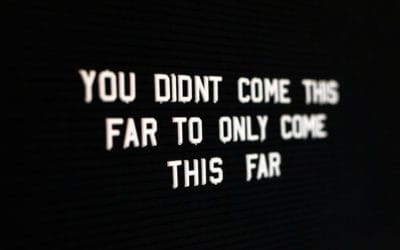Why and how can we make the change?
Let’s dig in.
Why should you care about teaching personal finance?
If you are in academics, my presumption is that you care about educating future physicians on how to take care of patients. How well do you think those future doctors will care for their patients if they feel the noose tightening around their neck as they suffocate in debt?
What if, as they age, they realize that retirement is just a figment of their imagination? This can happen if no one ever cared enough to teach them how to budget, save, and invest their money. They are at the point where the numbers just don’t add up. How well do you think they will take care of patients then?
I am sure it is tough to imagine a world where a disconnected administrator tells the doctors you trained how to do their job (even if the administrator can’t do it themselves). What if your future doctor had the knowledge to achieve financial independence so that they could stand their ground when people encroach on their craft unnecessarily?
All of these reasons, and many more, should encourage you to stop sucking at your job. Teach your students and residents about money. Answer their questions. Don’t let it be taboo. If you don’t know the answer, go and find someone who does – and provides non-conflicted information and advice.
The time is past where we ill-equip our future doctors to know how to take care of themselves so that they can take care of others. Just do your job. That’s all I am asking.
How can I teach personal finance to them?
Teaching students about personal finance requires a certain amount of transparency. Be open and honest. Put the time in to learn the Pareto Principle (the 20% of the work that accomplishes 80% of the results). Suggest some good physician finance books for them to read.
If you can’t teach them, then encourage someone else in your program with the requisite knowledge to create a curriculum for the trainees. Give them the support that they need to fix the problems that you and I both know exist.
You should also try and be an example of someone who places an emphasis on being intentional about your debt and the financial goals you hope to achieve. When do you want to become financially independent? How are you going to do it? How did you deal with your loans?
These are not trade secrets. They are secrets that are rarely traded. Our trainees deserve better.
Resources and Take Home
Read the resident physician finance page and the attending physician finance page. That would be a good starting point.
Consider listening to podcasts like ChooseFI, White Coat Investor, or the Mad Fientist. Then, read a few books. Take a few minutes per week to read a few recommended blogs.
The point is that it is your responsibility, as an academic attending physician, to teach our trainees about personal finance. And the resources now exist. If you can’t do it, then support someone who will.
Our residents deserve better. It really is that simple.
Do you have a resident or student financial curriculum where you work or study? What are the components involved in your program? If you are a resident, what topics do you wish were covered during your training? Leave a comment below.





This is actually what got me to start the blog. I offered to participate in my residencies conference to talk about financial planning / investing. It was amazing to see how most had no clue what steps to take but were eager to learn. Simple discussion about compound interest and investing in index funds got them staying after conference to ask questions when normally they leave at the first sign of noon.
Another place I think Academics needs to make some adjustments is advice on career types. I see too often that the unviversity employed ED attending doesn’t really know how to advise residents on contract negotiations or even understand some of the reimbursement models. If you don’t know then bring in outside people because advising residents requires multiple view points
I had the exact same experience. Many times my intraoperative teaching consists of pertinent details related to the case and then is succintly followed by financial topics. The residents know I love talking about it and they like to soak it up. I usually have to leave the room before they run out of questions.
Glad we are on the same team! Gotta fix the problem.
P.s. agree on your second point. I am a failure there. I know very little about contract negotiation.
Spot on commentary. It really is time that medical students and residents get proper financial training in the curriculum.
You are absolutely right about how can a doctor give adequate patient care if in his or her mind financial discord is preoccupying them? Being in heavy debt will likely force them to practice medicine in a non-ideal way. Trying to cram way too many patients in too little time just to chase the dollar.
I do think there is a culture change but I may be biased because the people that come to physician blogs have this mindset but likely represent a very small subset of the actual #s practicing.
Your residents are lucky to have you as a mentor. You aren’t fully preparing residents and students for their career if finance isn’t part of the conversation.
I spend time with our new hires that are straight out of residency to make sure they understand the group’s 401k, HSA, Cash Balance plan, etc. I’ve even convinced a few to start doing backdoor Roths.
It is a huge gap in medical education. Luckily there has been an explosion of physician finance blogs to help fill the gaps.
Your new recruits are lucky to have you, too!
As I learned from POF: a rising tide raises all boats. The more physician finance blogs the better, in my opinion. We all have a bit of a different slant.
Keep up the good work, SHS!
I love love love the perspective in this post. I had never really connected that there are a good number of academic physicians out there are who are soaking up the financial wisdom of the numerous physician bloggers.
I often consider the problem of how to educate the thousands of students and residents about finance before they finish training. It seems like an insurmountable problem.
But it makes so much sense to call these academic readers on the front lines to take action. I bet there are many would-be teachers who just need a little structured information and encouragement to help them get started.
Maybe that is the solution. It would be nice to see a blog or just a series devoted to helping nudge academics to do more mentoring.
Thanks, Johanna. I agree that the problem seems insurmountable!
The issue with nudging academics to do more mentoring is, unfortunately, that many of them don’t know this stuff either. So they never make it to these sites.
I am slowly, but surely, trying to spread that word through this website and through my non-anonymous work at my main employer.
Hopefully the spark will lite a fire at some point!
Part way into my first year as an attending, I became interested in physician finance and planning how to dig myself out of my financial hole. Now I am somewhat obsessed with it. I plan on giving an informal talk to the residents in my program in the next 3-6 months about the various aspects of budgeting, managing debt, and retirement among other topics. I am by no means an expert (other than budgeting…I rock that), but I figure I can at least introduce some basics, get them thinking about it, and introduce them to my favorite physician financial blogs so they can keep on learning and hopefully help others down the road.
That’s great, Way Work! I think it’s so important to start the conversation with our trainees and you are doing just that.
Keep up the good work, and send them my way if I can ever be of any help!
TPP
I gave a marathon 2 part lecture last year. This year a colleague, who is also interested in personal finance, and I are developing a year long lecture series and going to hit all the major personal finance and FI topics.
We are pretty stoked and if it is well received we might branch out to other departments! 🙂
Man, that would be my dream!!! Working on trying to do that in my own department this year (having a few lectures)
I’m happy to share content, lectures and ideas! It will be fun! ? If you are interested email me and we can get a conversation going.
Sounds good. Let me secure the lecture time and then I may be giving you a shout!
I appreciate the offer
I’d be happy to share ideas, lectures and content. It will be fun! 🙂 Email me if you want to start up a conversation.
Training doctors to care for the health of others without out helping train them how to take better care of themselves financially, physically, mentally, and emotionally is educational malpractice.
Completely agree!
Great post. Not everyone has to start a curriculum, give talks,or write a blog on FI. Just broach the topic of finance with your trainees. If we start talking about finance at work, I believe that will go a long way. There is still a stigma around talking about finance, especially in medicine.
That said, I am actually starting up a “Finance for residents” series of monthly noon talks at UNR (University of Nevada Reno). My hope is to build a curriculum spanning 3 years that will cover all sorts of topics (e.g. compound interest, saving/budgeting, investing, insurance, FIRE, comparing job offers, etc.). My first talk will be in August on Compound Interest–one of my favorite topics. I think the only prerequisite to doing something like this is that you are passionate about finance.
I agree, John. I think one of the biggest goals right now is making money no longer a “taboo” subject. The more we talk about it the less often that problem will occur. And, honestly, it is that taboo nature that prevents many curricular activities and courses from ever starting.
Your residents are fortunate to have you! I wish your efforts nothing but pure unadulterated success!
TPP
Jimmy-
You’re absolutely right about this. I give financial literacy talks at my hospital many times each year, plus offering one-on-one coaching with hospital staff and their spouses. One thing that has been really eye opening for me is the importance of teaching our non-physician colleagues, such as nurses, medical assistants, administrative staff, and junior team members. Some of the proportionally biggest mistakes I see made are by my youngest team members.
A couple of years ago, I was sitting down for one-on-one coaching with a young couple in their early 20s. They both had nicer cars than me (by a lot) and had a total debt greater than twice their combined annual income. We started talking about making some radical choices to get radical results, and it was clear that this was the first time they’d heard about any of this. We should be teaching this stuff in high school, and it’s just not mainstream yet. Folks like us (and all physicians) need to keep serving and teaching.
Keep it up!
-Brent
http://www.TheScopeofPractice.com
This post resonated with me alot. I studied a bit of economics and learned about personal finance early on in college and then was surprised the gap in financial knowledge. In my intern year I slowly introduced people to the books that I read to learn about the basic principles of personal finance and eventually word spread around the program. I developed a simple intro to personal finance lecture for my program this last year.
But I think it’s important to teach these things. As residents we are constantly learning from our attendings and we clearly see who is successful and who is struggling but there is always that barrier of secrecy with regards to money management.
Glad you can relate! There just aren’t enough people out there talking about this stuff, though. Keep spreading the good word! You never know who you might save from making some catastrophic financial mistake!
TPP
There is a treasure trove of personal finance information out there for the general public to consume. It is not a mystery and should not be difficult. Personal finance and basic economics is something that should be taught to everyone and should be a mandatory part of the curriculum in high school and college. Laying the foundation is easy and know that you build wealth over time. Educate yourself, be curious, and don’t expect your attending to hold your hand. Books like “The Wealthy Barber” and “The Millionaire Next Door” are old school books but the message is timeless. Podcasts and YouTube channels like The Money Guy are phenomenal, FREE information if you’re willing to learn. Dave Ramsey is the King of Debt Reduction ideas. The discipline that you used to get through medical school will be the same type of discipline you’ll need to establish a basic personal finance routine. 1) Live within your means and establish a budget 2) Pay yourself first by establishing an emergency fund of 3-6 months of expenses and put in enough money in to get your employer match with your 401K, 403B, etc. 3) PAY OFF your student loan and credit card debt. Have a game plan to do it (e.g 10 years) and don’t cave into the peer pressure of keeping up with your colleagues. Do you really need to buy a 10K square foot house? What does that high maintenance spouse really bring to the table besides major credit card bills? If you choose to keep up, you do so at your own peril and will probably live in debt most of your working life 4) Once you are free from the shackles of the student loan debt, you can turbo charge your savings and investments with the help of a good fiduciary who wants to help you build wealth NOT take your money with exotic sounding investments. If the will is there, you will build wealth, there is just too much info out there…live like no one else so down the road…you’re living like no one else.
Dave Ramsey gets a lot right on the debt side… Though, I think leveraging a low interest mortgage in lieu of investing.
That said, I agree. It isn’t complicated in terms of concept… It’s hard in terms of discipline. That’s why I spend so much time talking about behavioral finance.